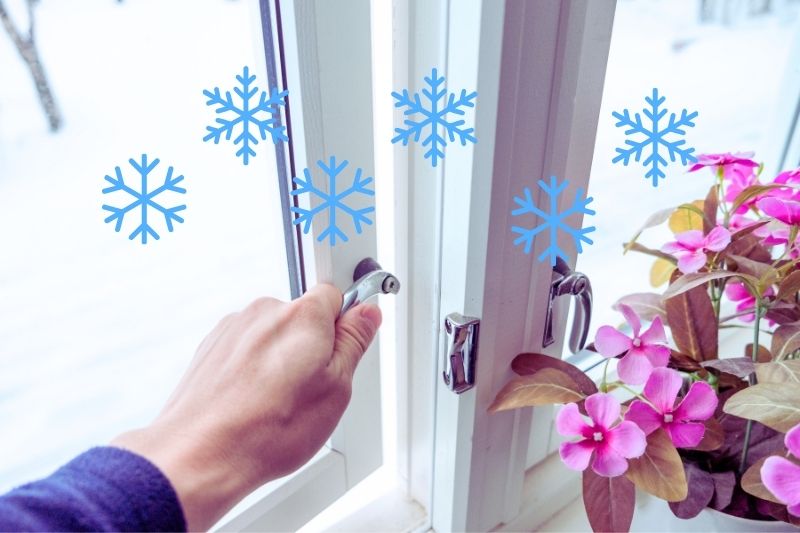With winter around the corner, many of you will be wondering if you should open your windows during the coldest season of the year or if they should remain closed at all times.
So, what’s the deal? Should you open the windows in your house during the winter?
There are a number of benefits to consider when you open your windows during the winter months.
These include better air quality, the ability to remove odours, and to limit condensation and mould.
However, there are a few drawbacks, including you may lose heat and your heating system may work a little harder.
That being said, you can mitigate many drawbacks by strategically opening your windows and only leaving them open for a certain amount of time.
Let’s look at this in more detail.
Is It Better to Have Windows Closed or Open During the Winter?
Let’s look at the main benefits and drawbacks of opening your windows and keeping them closed during the winter months in the UK.
Benefits of keeping windows closed in winter
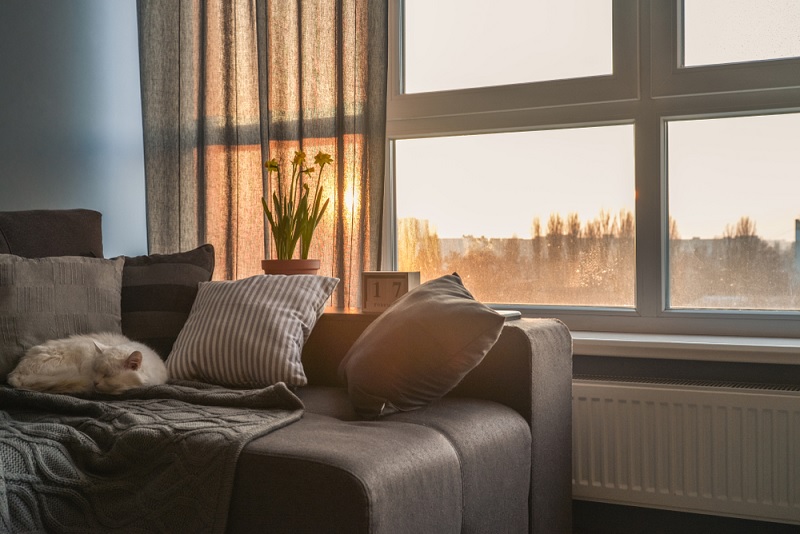
1. No warm air is wasted
The main benefit of keeping your windows closed is that you won’t waste heat. By shutting the windows, the hot air won’t escape outside, and your house will remain warm.
2. You’ll have a comfortable and toasty home
As a consequence of the above, you’ll have a snuggly and toasty home to relax and unwind in after a busy day.
Drawbacks of keeping windows closed in winter
1. Poor air quality
During the winter months, you will spend a considerable amount of time cooped up indoors.
If you don’t open the windows, you’ll create a micro-climate where the same contaminated air floats around all day long.
The air will be filled with your breath, germs, hot air from the bathroom and kitchen, smoke, and air fresheners (to name a few culprits).
The contaminated area will be teaming with pollutants, which can encourage dampness and mould, which can then bring on sickness and accelerate infections.
2. Stale air
Don’t forget that in an airtight environment, where no windows are opened and no fresh air is allowed to enter, you’ll end up with stale air. This is similar to what you get in houses that have been left empty for years.
You tend to get stale air when there’s a distinct lack of air movement and clean air in the area.
This typically occurs when the air in the house continues to mix with carbon dioxide, humidity, and other pollutants (noted above).
Ultimately, your house will take on a murky, stuffy sort of smell. As odd as it sounds, the stale aroma kind of feels heavy and can make you feel uncomfortable.
3. Condensation
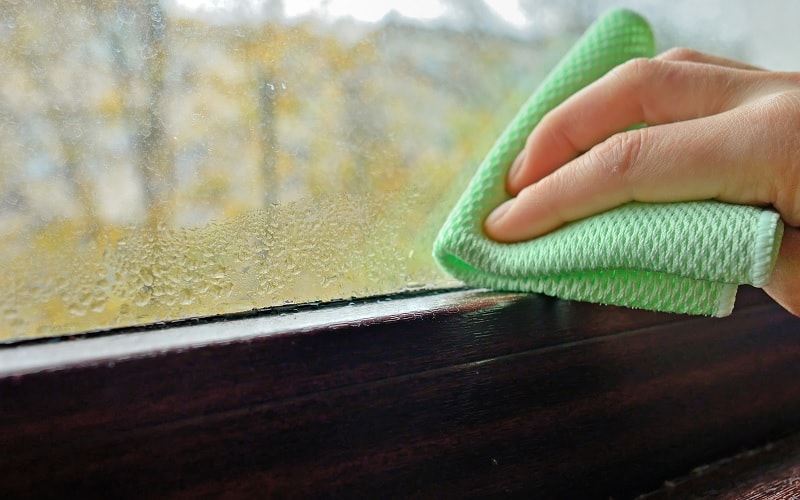
In addition, if you keep warm air locked into a house with poor ventilation, and this hot air makes contact with a cold surface (a window), you’ll end up with condensation.
This issue may seem insignificant on a surface level. However, it can quickly lead to structural and mould-related problems in a home.
Don’t forget that the appliances you use throughout the day and your daily activities will also add to the home’s humidity (showering and cooking).
This is all additional moisture. And if this extra moisture hasn’t got anywhere to go, it will eventually become condensation.
Moreover, said activities may be carried out more often during the winter, increasing the humidity even more.
For example, you may shower before work and then take a bath before bed to warm up. You may also use the tumble dryer to dry laundry.
You’re also likely to cook more hot meals in the winter, so there’ll be increased steam from the saucepans on the cooker.
4. Smells
As mentioned above, if you don’t open the windows throughout the winter, you’ll have stale and contaminated air in your home.
What’s more, is that this air will be pretty smelly. Houses that aren’t aired sufficiently tend to smell musty and yucky!
Sometimes, you may find the smell displeasing, distracting, and uncomfortable to be around. The foul aroma may even make you feel unwell.
But, of course, if you’ve been living in the environment for a while, the aroma may not be evident to you. But to others, it will be.
5. It gives rise to health problems
A distinct lack of fresh air in a home will give rise to bacteria, infections, and viruses.
For example, during the winter, you typically catch a cold. And if you don’t allow fresh air into the house (through open windows), you’ll spread the germs about, and everybody in the house will get a cold.
You will see similar effects if you’re a smoker who doesn’t open the windows. As you smoke, the smoke won’t leave the house. It’ll just hang around, polluting the air and creating a thick fog.
Consequently, you may become short of breath or suffer other respiratory issues.
Benefits of opening windows in winter
1. Fresh air
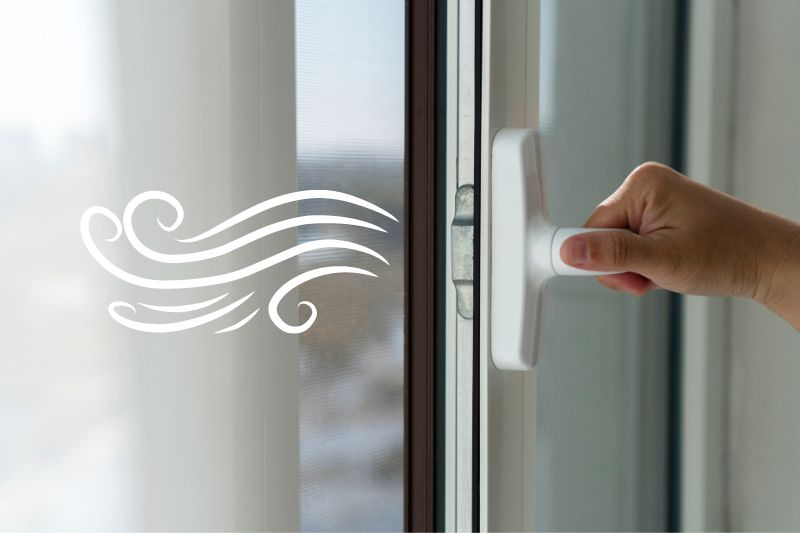
The main benefit of opening your windows for a short burst of time during the winter is that your home gets access to fresh air.
Stale pollutants get released outside, and a batch of clean air moves around the house.
This new air will be oxygen-rich and not contaminated with all the germs that are locked up in your house.
In turn, you may feel refreshed and have a clearer head, and your overall well-being may improve.
The fresh air will also flush out some viruses and infections, so you may not succumb to illnesses that your other family members have suffered from, like the common cold.
Clean, moving air can also get rid of the stale feeling and aroma in your house. You may notice that the house feels better overall and doesn’t feel as heavy/uncomfortable.
2. Reduce humidity and condensation
By allowing humid air out of your house for a short period of time once a day, you can reduce the amount of condensation you have locked up in your home.
Consequently, you should see less mould in your home because your environment isn’t quite right for it.
3. Removes bad odours
Any lingering odours in your home can also be removed by opening your windows during winter.
A sharp burst of fresh air can remove the pesky smells that are annoying you – like that stale stench that you’ve got hanging around!
Drawbacks of opening windows in winter
1. Loss of energy
The main drawback of opening your windows in winter is that you’ll likely lose some heat through the open windows.
This concern is why many people avoid opening their windows during the colder months.
However, if you manage the situation carefully, you can limit the amount of heat you lose (More on this later).
In addition to losing heat, you may notice that when you open up your windows during the winter months, the cold air that rushes in will tell your thermostat to up the temperature.
Consequently, your heating system may work harder to combat heat loss. This could affect your bill! (Again, more on this later).
2. You may feel uncomfortable
If you open your windows up in winter, you will likely feel a slight draft/cold breeze. This isn’t ideal for everyone.
There are, of course, ways you can combat this, the easiest being to layer up your clothes for the short time that your windows are open. And to half the amount of time you keep your windows open!
3. Rain may come in
Opening your windows up in the winter opens your home up to the elements. The most popular one is rain.
Although it’s unlikely that a considerable amount of rain will come into your house when you briefly open your windows, it may be a drawback worth considering.
The easiest way to manage this is to wait for the rain to stop and open the windows.
So, is it worth opening the windows in winter?
Yes, it is worth opening your windows briefly during the winter months because it’ll improve the air quality in your home and reduce indoor pollution (contaminants).
In addition, opening the windows can reduce humidity and condensation in a house, which is important during the colder months when we’re likely to cook, bathe, and dry clothes indoors.
Plus, by opening the windows, the fresh, clean air can circulate, improve your overall health, and remove odours.
Of course, you may lose some heat in the process. But you can manage this by following the guidance below.
If you don’t open the windows, you’ll have stale air and pollutants floating around. The house will smell funky, feel humid, and you’ll see condensation on the window panes/walls.
How Long Should You Leave Windows Open for in the Winter?
During December, January and February, you should open your windows for approximately five minutes each day.
This five-minute burst of fresh air is more than enough time for clean air to enter the home and for unwanted odours and pollutants to leave.
When you open your windows up, you should open them wide for five minutes. By doing this, you’ll speed up the air exchange.
Of course, opening up your windows wide will mean losing some heat. To manage this, you could:
- Lower the heating temperature in your house so the change isn’t so drastic. In turn, your heating system won’t have to work too hard to compensate for the difference in temperature.
- You could open the windows before putting your heating on.
- Turn the heating off and open your windows a few hours later when the house has cooled down.
There are, however, times when you should keep your windows open for prolonged periods during the winter months. These include when cooking, drying clothes or bathing.
You should also try to keep the windows open for at least 10 minutes after you’ve finished the activities mentioned above.
This will allow a lot of moisture to escape outside so it won’t settle on the cold surface in your home and turn into condensation.
Note: Try not to open windows that are near your thermostat. The cold air that rushes in will make the thermostat think that the temperature has dropped in the room, so it’ll up the temperature. Consequently, your heating system will work harder, and your bills may increase!
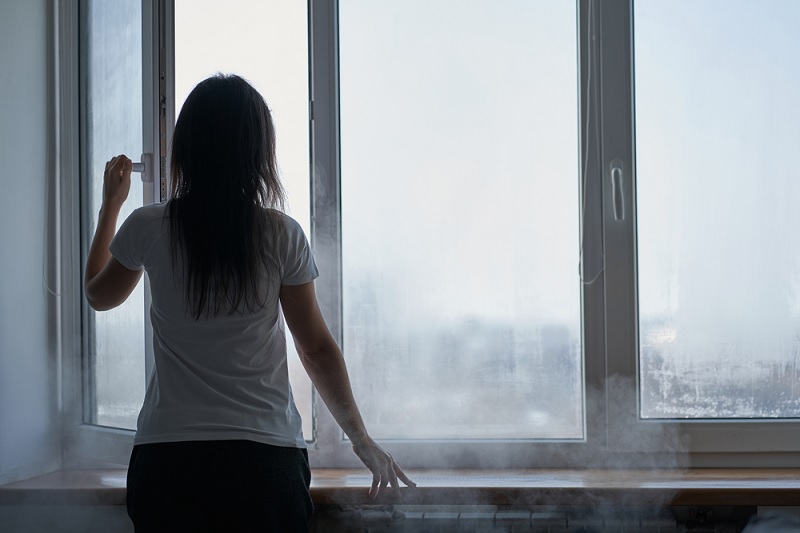
Should You Open the Windows When the Heating Is On?
One of the biggest concerns with opening the windows when the heating is on is that you’ll waste warm air. This is true. When you open a window, heat will escape through it.
You may also notice that after opening a window and allowing cold air into a room, the thermostat clocks the difference in temperature and tells the heating system to crank the temperature up a notch. In turn, the system has to work harder to compensate for the difference in temperature.
However, there are ways you can reduce these problems so that you can open your windows in winter without worrying about losing loads of heat. For example:
- Open the windows before the heating comes on (for example, first thing in the morning).
- Limit how long you have the windows open (approximately five minutes).
- Open windows that are away from the thermostat so the heating system isn’t impacted too much.
Opening the windows up for a short burst of time per day (five minutes) shouldn’t impact the heating too much as long as you take the points above into account.
You shouldn’t leave your windows wide open all day and have the heating running in the background.
If you do this, your thermostat will tell the heating system to work harder to warm up the house, but all the warmth will escape outside. So, you’ll end up wasting money and heat in the process.

Bethan has a passion for exploring, reading, cooking and gardening! When she’s not creating culinary delights for her family, she’s concocting potions to keep her house clean!
